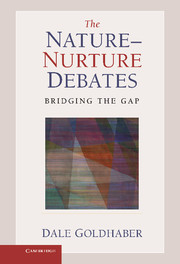4 - The Classic Debate
Published online by Cambridge University Press: 05 August 2012
Summary
This chapter and the next examine the four relatively distinct approaches to the nature–nurture debate. In this chapter, we look at models favoring a reductionist approach to the issue, that is, models that attempt to examine the influence of variables independently of each other. In the next chapter, we look at models favoring a systems approach, that is, models that see variables in constant interaction with each other. The reductionist approach is the classic debate; the systems approach, the new debate.
The classic debate is just that, a classic. It seems to have been going on forever and, given the elements of the debate, is likely to continue going on forever. The players change periodically as do the particular statistics, but the fundamental question is always the same: What percentage of the variance is caused by nature and what percentage of the variance is caused by nurture? The fact that there seems to be no end in sight to the classic debate is perhaps one reason why many have abandoned reductionist approaches to development and have moved on to the more integrative, systemic ones.
- Type
- Chapter
- Information
- The Nature-Nurture DebatesBridging the Gap, pp. 59 - 90Publisher: Cambridge University PressPrint publication year: 2012



